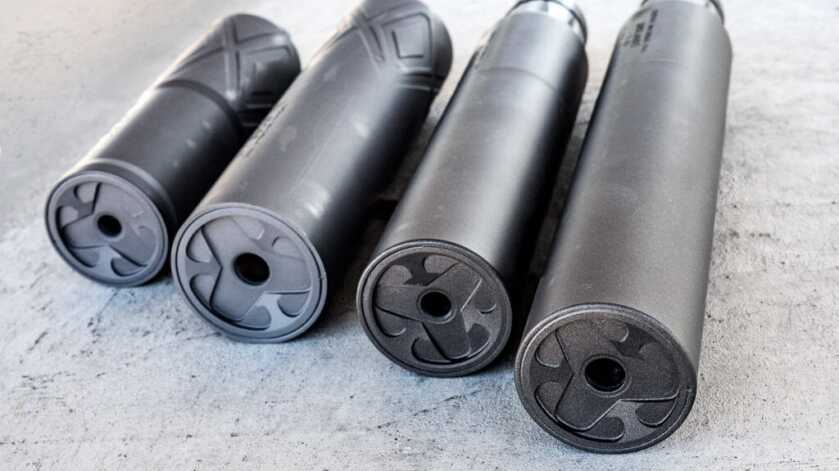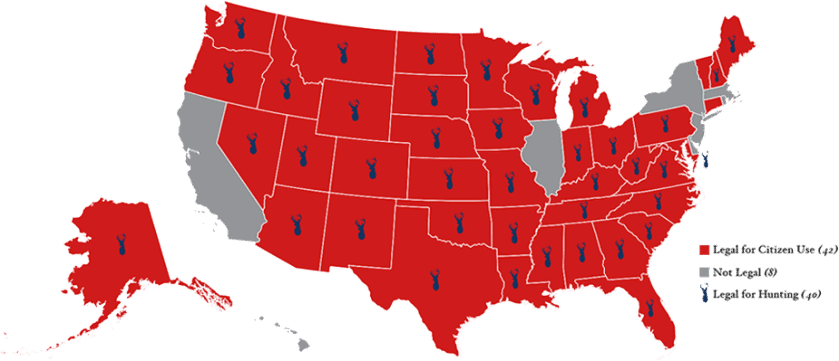

Criminals almost never use suppressors. In 2017, the ATF prosecuted 44 “silencer-related crimes,” and only six of those cases involved defendants with previous felony convictions. It’s safe to say that a vanishingly small percentage of today’s 2.6 million suppressors are ever used for nefarious purposes.
But the anti-gun lobby has never concerned itself with data and common sense, and they aren’t about to start now.
In 2022, eight anti-gun strongholds still prohibit civilian suppressor ownership: California, Illinois, New York, Massachusetts, Rhode Island, New Jersey, Delaware, and Hawaii.

Suppressors are legal to own in the 42 other states provided applicants jump through the appropriate federal and state hoops. States can regulate suppressor ownership or use, so be sure to check the laws in your area. On the federal level, the process to acquire a suppressor is regulated under the National Firearms Act of 1934. According to the American Suppressor Association, to own a suppressor in the United States you must:
- Be at least 21 years of age to purchase a suppressor from a dealer.
- Be at least 18 years of age to purchase a suppressor from an individual on a Form 4 to Form 4 transfer (contingent on state laws).
- Be at least 18 years of age to possess a suppressor as a beneficiary of a trust or as a member of a corporation (contingent on state laws).
- Be a resident of the United States.
- Be legally eligible to purchase a firearm.
- Pass a BATFE background check with a typical process time of 8 to 10 months.
- Pay a one time $200 Transfer Tax.
That fifth requirement, “be legally eligible to purchase a firearm,” also comes with a set of criteria. Most gun owners are familiar with the “prohibited person” list from Form 4473. Per our good friends at the ATF, this list encompasses anyone who:
- Convicted in any court of a crime punishable by imprisonment for a term exceeding one year;
- Who is a fugitive from justice;
- Who is an unlawful user of or addicted to any controlled substance (as defined in section 102 of the Controlled Substances Act, codified at 21 U.S.C. § 802);
- Who has been adjudicated as a mental defective or has been committed to any mental institution;
- Who is an illegal alien;
- Who has been discharged from the Armed Forces under dishonorable conditions;
- Who has renounced his or her United States citizenship;
- Who is subject to a court order restraining the person from harassing, stalking, or threatening an intimate partner or child of the intimate partner; or
- Who has been convicted of a misdemeanor crime of domestic violence.
In short, if you live in one of the 42 states and are legally allowed to own a firearm, you can also own a suppressor.
Suppressors Delivered to Your Door
One call, does it all. Select your suppressor, create your trust, fit your gun, deliver to your doorstep. Silencer Central – Simple, Smart, Easy! Call 866-693-3982 or visit https://www.silencercentral.com/about-us/
Hunting
But what about hunters?
Most states that allow suppressor ownership allow gun mufflers to be used in the field. This makes sense. For many gun owners, hunting is the only scenario in which they might fire a rifle, handgun, or shotgun without hearing protection. Every one of those shots damages hearing, which is why many veteran hunters have to be asked twice to pass the gravy.
Unfortunately, despite the proven health benefit of suppressor use, a handful of states still don’t allow suppressors in the deer stand: Maryland, Connecticut, and Vermont.
These states argue (among other things) that suppressors allow hunters to take game illegally. Because game wardens often rely on hearing a shot report to identify poachers, some worry that suppressors will allow criminal hunters to harvest game out of season.
This assumes, of course, that the extremely law-abiding people who run the gauntlet to own a suppressor will turn around and use that suppressor to break the law. This argument would also hold more water if the states that allow hunting with suppressors see more poaching than states that do not (hint: they don’t).
History of Suppressor Legislation
No matter where you live, you should keep abreast of the legislation being discussed in your state capitol. Most years, pro-2A politicians in restrictive states will propose legislation that allows suppressor ownership or use while hunting. Such bills have been proposed in Connecticut, Illinois, and Massachusetts in the last fear years. None of those recent bills made it out of committee, but since 2015, Minnesota, Vermont, and Iowa have legalized suppressor ownership. Since 2011, 17 states have legalized suppressor use while hunting.
Unfortunately, that progress is under constant threat. Some anti-gun politicians see suppressor bans as low-hanging fruit. The suppressor constituency is much smaller than the larger constituency of gun owners, and these politicians believe they can earn brownie points with the anti-gun lobby without feeling consequences from gun owners.
This almost happened in Virginia in 2019. Democrats, who had just gained control of the entire legislature, introduced a bill that would have allowed local law enforcement to block suppressor ownership. The legislation didn’t pass, thanks in part to pro-gun organizations like the Virginia Citizens Defense League and the American Suppressor Association, along with overwhelming opposition from gun owners.
On the federal level, pro-suppressor organizations are pushing the Hearing Protection Act. The HPA would remove suppressors from the NFA list and regulate them like long guns. Rather than going through the hassle, cost, and wait of the current suppressor regime, prospective owners could purchase suppressors by passing a simple NICS background check.
Many hoped the Republican-controlled Congress under President Donald Trump would vote on this legislation. That didn’t happen, but Republican victories in 2022 and 2024 could put the HPA back on the table.
Suppressors are easily available in many other countries, but the U.S. Congress voted in 1934 to heavily regulate their use by imposing a $200 tax stamp on all suppressor purchases. While that tax was cost-prohibitive in 1934, suppressor ownership boomed in the 21st century. Thanks in part to companies like Silencer Central that streamline the purchasing process, the number of registered suppressors has grown from 285,000 in 2010 to over 2.6 million in 2020.
Get a Suppressor in as little as 30 days with the NEW ATF eForm System – Step-by-Step
Why a Silencer Might Prevent Dementia & 17 Other Reasons You Need a Suppressor
Interested in getting a suppressor? Check out GunsAmerica’s Suppressor Academy.


Anyone can legally own one as it is a God given right and also a right backed up by the constitution. Those that think like government and ATF and think they need a permit to have one are the ones that are illegal.
Good update. back when i was a scout we were invited by a rancher to reduce his lil varmints. I had dad’s old singleshot, everybody else had a repteaer. the two on my sides sat back of the firingline to reload, and semiauto’d their mags from sitting, w/o returning to the firingline. I never knew what tinnitus was, but i’ve had it since. Ruined my hopes of a musical career! I have studied many suppressor designs since, and some of them are tougher and/or easier to clean, but ya pays ya money and ya takes ye choices, and ya waits yer ten months, and i finally bought an AR so a supressor is on the wishlist, and i will hafta freshen-up my research.
The anti supresser, laser and other gun related hysteria is based on ignorance created byTV and movie depictions of the capabilities of these devices.
Has anyone ever questioned Schumer’s Boxer’s, Pelosi’s or Waters’ actual knowledge of firearms ?
I’m always amused by how some people, generally liberals, seem to think that federal and state laws that they don’t like are optional, act accordingly, and get away with it.
Want your weed? No problem.
Want to kill your unborn child? Can’t have laws against that, or people would just do it anyway, but “unsafely”.
But heaven forbid someone does something perfectly rational to protect their own safety and hearing.
We cease to be a nation of laws when laws are enforced unequally.
You can use a suppressor to hunt in Maryland